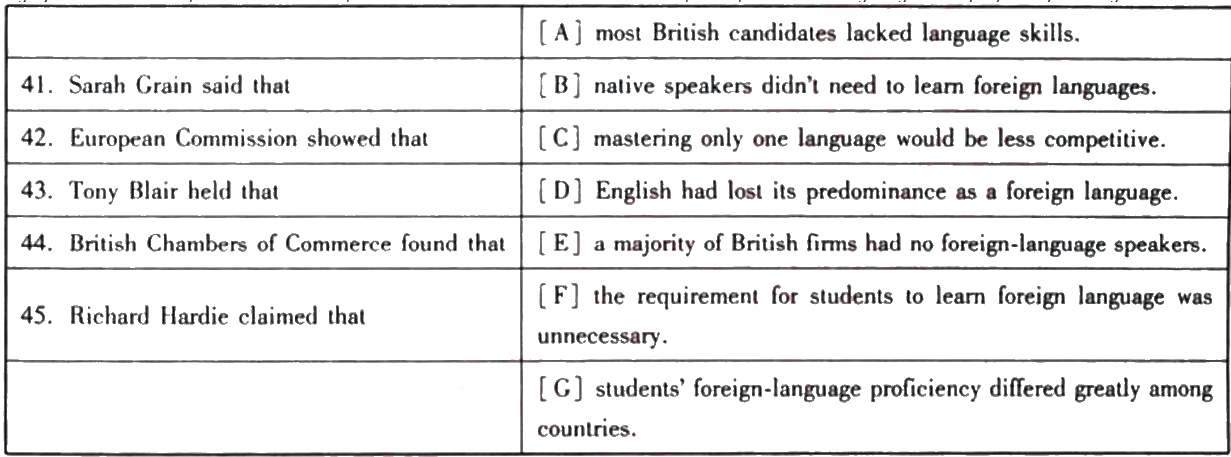单选题
1分
The last time she was recruiting for her export-sales team,Sarah Grain hired a Lithuanian who speaks...
The last time she was recruiting for her export-sales team,Sarah Grain hired a Lithuanian who speaks Russian,Polish and German.Her two previous hires for Eriez Magnetics,which makes in-dustrial equipment in South Wales,were an Italian who also speaks French,and a Venezuelan who speaks Spanish and Portuguese.All of them speak fluent English."There were no British applicants who had the requisite language skills,"she says.Ms Grain's conclusion is not unusual for a British company.In 2012 a European Commission survey tested the foreign-language proficiency of 54,000 students aged 14 and 15,in 14 nations.Sweden came top,with 82qo of pupils reaching an"independent"or"advanced independent"standard.The average for all 14 states was 42%.England came bottom,with just 9%.Part of the explanation is that many people's second language is English,while many Britons continue to believe that,as native speakers,they do not need to bother with foreign languages.They may be right-in tenns of commurucation.But it means that,not only are they missing out on much cultural interaction,they may also be harming their own job prospects.they have not been helped by the educational policies of successive govemments.In 2004 Tony Blair's hbour govemment abolished the requirement to learn a language after the age of 14,causing the numbers taking a language CCSE exam at 16 to fall by half in state schools over the next seven years.Concerned about this rapid decline,the coalition govemment brought in a new performance indicator called the English Baccalaureate,or EBacc,in 2011.A modern language was one of its five core disciplines.Language teachers-an embattled breed-rejoiced.The number of students ente-ring a GCSE language exam in 2013,the first year the changes took effect,rose by 20%.Now,however,those gains could be lost,as the govemment has seemingly loosened the re-quirement.From 2016,under a new initiative called Progress 8,it has extended the number of core subjects to eight,appearing to make learning a language voluntary.This has pleased some teachers,who felt the EBacc was too narrow,but linguists are shocking.The decline of languages at GCSE has inevitably had an effect higher up the academic food chain.Though the number of those studying languages to A Level will increase thanks to the GCSE cohort of 2013-2014,it is likely to fall back again.French and German are half as popular as they were 20 years ago.The number of universities offering language degrees has fallen,too:by 50%for Cerman and 40%for French since 1998.The number offering Spanish has also fallen.Degrees in other languages,such as Chinese and Arabic,are becoming more popular,but they are still rare.The economy and the labour market bear the consequences.In 2012 the British Chambers of Commerce found,in a survey of 8,000 BriLish companies,that 96%had no foreign-language speakers.First-lime exporters cited language as a barrier to entering intemational markets.Though Britain makes up 12%of the population of the EU,less than 5qo of EU civil servants in Brussels are British.Not enough Bricons can fulfil the language requirement of being able to work in French or Cerman.And even if monoglot Brits can get jobs at multinationals,claims Richard Hardie,non-executive chairman of the British arm of UBS,a bank,"the chances of getting to the top if you only have English are much lower than before".

European Commission showed that

European Commission showed that
参考答案: G
参考解析: 根据European Commission定位到第二段第二句:In 2012 a European Commission survey tested the foreign-language proficiency of 54,000 students aged 14 and 15,in 14 nations.选项[G]与之相关。其中foreign-language proriciency,students等词为原词复现;countries=nations。此外,下文说:Sweden came top,with 82qo of pupils reaching an"independent"or"advanced independent"standard.The average for all 14 states was 42%.England came botLom,with just 9%.由此可见,各个国家学生的外语精通能力各不相同,符合选项[C]differed greatly among counLries的表达。综上,[G]为答案。

 百度扫一扫练题
百度扫一扫练题
 关注千题库公众号
关注千题库公众号








